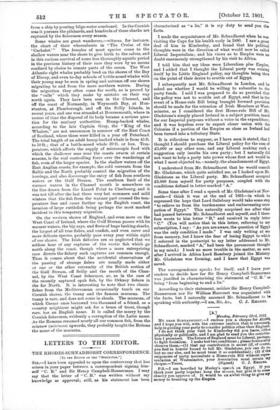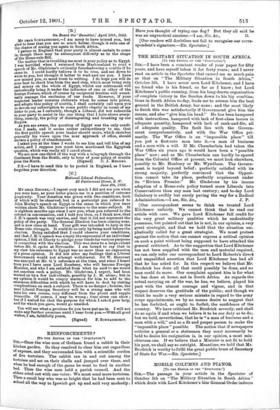LETTERS TO THE EDITOR.
THE RHODES-SCHNADHORST CORRESPONDENCE. [TO THE EDITOR OF THE "SPECTATOR."] have been appealed to upon the controversy that has arisen in your paper between a correspondent signing him- self " C. B." and Sir Henry Campbell-Bannerman. I may say that the letter of " C. B." was written without my knowledge or approval; still, as his statement has been
characterised as "a lie," it is my duty to send you the facts.
I made the acquaintance of Mr. Schnadhorst when he was visiting the Cape for his health early in, 1890. I saw a greet deal of him in Kimberley, and found that his political thoughts were in the direction of what would now be called Liberal Imperialism ; and his views as to Empiiss were no doubt enormously strengthened by his visit to Africa.
I told him that my ideas were Liberalism plus Empire, and I added that I thought the Liberal party was ruining itself by its Little England policy, my thoughts being then on the point of their desire to scuttle out of Egypt.
I subsequently met Mr. Schnadhorst in London, and he asked me whether I would be willing to subscribe to the party funds. I said I was prepared to do so provided that the policy was not to scuttle out of Egypt, and that in the event of a Home-rule Bill being brought forward provision should be made for the retention of Irish Members at West- minter, as I considered the first Home-rule Bill of Mr. Gladstone's simply placed Ireland in a subject position, taxed for our Imperial purposes without a voice in the expenditure; and it was hopeless ever to expect closer union with the Colonies if a portion of the Empire so close as Ireland had been turned into a tributary State.
It is ridiculous to suppose, as I have seen it stated, that I thought I should purchase the Liberal policy for the sum of E5,000 or any other sum, and any Liberal making such a suggestion only insults his own party ; but I naturally did not want to help a party into power whose first act would be what I most objected to,—namely, the abandonment of Egypt I understood from Mr. Schnadhorst that he would consult Mr. Gladstone, which quite satisfied me, as I looked upon Mr. Gladstone as the Liberal party. Mr. Schnadhorst accepted B5,000 from myself for party purposes, coupled with the conditions defined in letter marked "A."
Some time after I read a speech of Mr. Gladstone's at New. castle—I think it was , at the end of 1891—in which he expressed the hope that Lord Salisbury would take some step "to relieve us from the burdensome and embarrassing occu- pation of Egypt." This naturally surprised me after what had passed between Mr. Schnadhorst and myself, and I there. fore wrote to him letter " B," and received in reply letter " C." (You will notice that in this letter, referring to my subscription, I say : " As you are aware, the question of Egypt was the only condition I made." I was only writing at sea from memory, but I knew the fear of losing Egypt to which I referred in the postscript to my letter addressed to Mr. Schnadhorst, marked "A," had been the paramount thought in my mind.) I took no more trouble in the matter, as soon after I arrived in Africa Lord Rosebery joined. the Ministry Mr. Gladstone was forming, and I knew that Egypt was saved.
The correspondence speaks for itself, and I leave your readers to decide how far Sir Kenry Campbell-Bannerman was justified in characterising the statement of " C. B. " as being "from beginning to end a lie."
According to their statement, neither Sir Henry Campbell- Bannerman nor Sir William Harcourt was acquainted with the facts, but I naturally assumed Mr. Schnadhorst to be speaking with authority.—I am, Sir, &c., C. J. RHODES.
[A.]
Monday, February 28rti, 1S91.
MY DEAR SCHNLDBORST,-4 enclose you a cheque for £5,000, and I hope you will, with the, extreme caution that is necessary, help in guiding your party. to consider politics other than England. I do not think your visit to Kimberley did you harm, either physically or politically, and I am glad to send you the contribu- tion I promised. The future of England must be Liberal, Perhaps, to fight Socialism. I make but two conditions ; please honourably observe them,—(l) that my contribution is secret (if, of course, you feel in honour bound to tell Mr. Gladstone, you can do so, but no one else, and he must treat it as confidential) ; (2) if the exigencies of party necessitate a Home-rule Bill without repre- sentation at Westminster, your Association must return my cheque.—Yours, (Signed) C. J. BliODZIL P.S.—I am horrified by Morley's speech on Egypt. If you think your party hopeless keep the money, but give it to some charity you approve of. It would be an awful thing to give my money to breaking up the Empire.
On Board the Dunottar,' April 25th, 1892.
Mr malt SCHNADHORST,—I am sorry to have missed you, but glad to hear that you are so much better, though it robs one of the chance of seeing you again in South Africa. I gather in England that your party is almost certain to come in, though there may be subsequent difficulty as to the shape of the Home-rule Bill.
The matter that is troubling me most is your policy as to Egypt. I was horrified when I returned from lltfashonaland to read a speech of Mr. Gladstone's evidently foreshadowing a scuttle if he came in. I could hardly believe it to be true, and sat down to write to you, but thought it better to wait and see you. I have now missed you, so must trust to writing. I do hope you will do your best to check him from the mad step, which must bring ruin and misery on the whole of Egypt, whilst our retirement will undoubtedly bring it under the influence of one or other of the foreign Powers, which of course by reciprocal treaties will event- ually manage the exclusion of our trade. However, if your respected leader remains obdurate when he comes into power, and adopts this policy of scuttle, I shall certainly call upon you to devote my subscription to some public charity in terms of my letter to you, as I certainly, though a Liberal, did not subscribe to your party to assist in the one thing that I hate above every- thing, namely, the policy of disintegrating and breaking up our Empire. As you are aware, the question of Egypt was the only condi- tion I made, and it seems rather extraordinary to me, that the first public speech your leader should make, which sketches generally his views upon the near approach of office, should declare a policy of abandonment.
I asked you at the time I wrote to see him and tell him of my action, and I suppose you must have mentioned the Egyptian question, which was really all I cared about.
We are now one-third of the way with a telegraph through the Continent from the South, only to hear of your policy of scuttle
from the North. (Signed) C. J. RHODES.
have to send this to be posted in England, as I have forgotten your direction:
National Liberal Federation,
42 Parliament Street, S. W. June 4th, 1892. MT mot RHODES,—I regret very much I did not see you when you were here, as your letter places me in a position of extreme perplexity. Your donation was given with two conditions, both of which will be observed, but in a postscript you referred to John Morley's speech on Egypt in the sense in which you have written about Mr. Gladstone's reference to the same subject. It is eighteen months ago since I saw you, when you referred to the subject in conversation, and I told you then, as I think now, that J. M.'s speech was very unwise, and that it did not represent the policy of the party: The General Election has been coming near, and is now close at hand. Your gift was intended to help in the Home-rule struggle. It could do so only by being used before the election. Being satisfied that I could observe your conditions, and that J. M.'s speech was simply the expression of an individual opinion, I felt at liberty to pledge your funds for various purposes in connection with the election. This was done to a large extent before Mr. G. spoke at Newcastle. I am bound to say that in my view his reference to Egypt was no more than an expression of a pious opinion. It did not alter my feelings that a Liberal Government would not attempt withdrawal. Sir W. Harcourt was annoyed at Mr. G.'s reference at the time, and since I heard from you I have seen Lord Rosebery, who will become Foreign Minister, and who I am satisfied from what he said to me would not sanction such a policy. Mr. Gladstone, I expect, had been worked on by a few individuals, possibly by J. M. alone ; but in my opinion it would be simply madness for him to add to the enormous difficulties with which he will have to deal by risking complications on such a subject. There is no danger ; besides, the next Liberal Foreign Secretary will be a strong man who will take his own course, very different from the pliant and supple Granville. Of course, I may be wrong ; time alone can show ; but if I waited for that the purpose for which I asked your help, and for which you gave, would go unaided.
You will see what a precious fix you have put me in. I will not make any further promises until I hear from you.—With all good wishes, I am, faithfully yours,
(Signed) F. ScHNADHOEST.















































 Previous page
Previous page